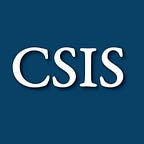The Week at CSIS: The Speeches, Discussions, and Events from July 16th to July 20th
CSIS hosts over 2,000 events a year, from major public speeches to small briefings. Join us here for an inside look at the events of the week.
7.16: With Partners Like These: Strategies and Tools for Counterterrorism Cooperation
The United States has used security cooperation to work by, with, and through partners in the counterterrorism fight. CSIS hosted a panel that examined areas of change and continuity in this fight from multiple perspectives: the changing nature of the threat; lessons learned from past partnership capacity building experiences; growing reliance on the U.S. military to broker and maintain these partnerships; and the United States’ evolving relationships with its counterterrorism partners.
7.17: Facilitating Humanitarian Assistance in South Sudan
After receiving its independence in 2011, the leaders of South Sudan were presented with an opportunity to collaborate and rebuild a country ravaged by decades of civil war. But after months of continued political tensions and mutual distrust among the historically antagonistic South Sudanese leaders, open conflict erupted in the country in late 2013. The inability to realize meaningful economic progress led to conflict between armed factions loyal to President Salva Kiir and Vice President Riek Machar. CSIS hosted a discussion to understand how the international community can deal with protracted humanitarian crises and address issues surrounding access to aid, with a specific focus on South Sudan.
7.17: Supporting Democracy in Challenging Times
Over the past decade, the work of promoting democracy has been increasingly challenging amidst a phenomenon of democratic recession and resurgent authoritarianism, which is increasingly viewed by scholars as a new era of ideological and political contestation. Systemic corruption, deep inequality and injustice, and the failure of governments to address the needs of ordinary citizens breed political instability, terrorism, and massive flows of refugees — conditions that threaten our own security and well-being. CSIS hosted a panel with the heads of the National Endowment for Democracy (NED), Center for International Private Enterprise (CIPE), International Republican Institute (IRI), National Democratic Institute (NDI), and the Solidarity Center to discuss the new challenges in supporting democracy.
7.18: Digitalization in the Industrial Sector: Implications for Energy, Technology, and Policy
As the energy industry continues its trend toward digitalization, new services and opportunities are being created for companies and regions. CSIS hosted a panel to discuss the ecosystem emerging around the digitalization of the energy industry, examining digitalization’s potential to simultaneously help increase reliability, decrease cost, and reduce environmental impacts. Speakers also touched on the behavioral standards for those firms handling data from the industrial sector, the role policy plays in the regulation of data transparency/ownership, and which actors have the most influence to establish and define values in this emerging sector.
7.19: From Washington to Brussels: A Discussion on the 2018 NATO Summit
Senator Jeanne Shaheen (D-NH) and Senator Thom Tillis (R-NC) are Co-Chairs of the Senate NATO Observer Group and members of the U.S. delegation to the 2018 NATO Summit in Brussels. Following the summit, CSIS hosted the two senators for a timely conversation on post-summit analysis as well as a discussion of the vital role that bipartisan Congressional leadership plays in tackling transatlantic security challenges. Senator Shaheen and Senator Tillis also touched on the specific role the newly constituted Senate NATO Observer Group will play in providing Congressional support for NATO and U.S. strategic interests in Europe.
7.19: Forging the Future of Jobs: A Conversation with Guy Ryder, Director General of the ILO
The world faces complex challenges posed by a growing and aging population, forced migration, persistent poverty, urbanization, and a series of technological disruptions impacting labor. The world needs 600 million new jobs over the next 15 years just to keep up with current demand. If channeled correctly, population growth could lead to a demographic dividend. Otherwise, this wave of human energy will be lost. CSIS hosted International Labor Organization (ILO) Director General Guy Ryder for a discussion on the future of jobs as labor faces these complex challenges.
